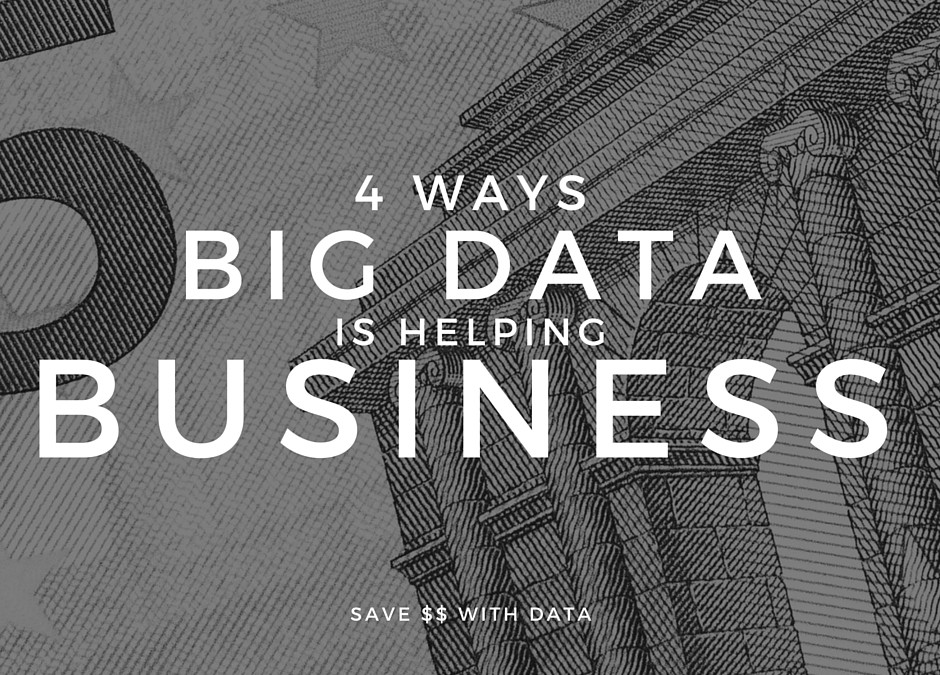
by Aleah Radovich | May 25, 2016 | Big Data
- 90% of all the world’s data has been created within the last two years.
- 25% of organizations now have a data scientist on staff.
- According to CIO, $3.2 billion was spent by companies on big data in 2010; it is predicted companies will spend $16.9 billion on big data by 2015
- $300 billion could be saved if big data was used effectively the US healthcare sector; thereby reducing expenditure by 8%
- Progressive Casualty Insurance Company, uses Big Data as part of its “pay as you drive” program, offers drivers the chance to lower their insurance premiums based on real-time analysis of their driving habits.
- 328 million things connect to the internet each Month!
- 91% of marketing leaders believe successful brands use customer data to drive business decisions.
More Facts About the Big Data Revolution

by Aleah Radovich | Apr 11, 2016 | Business Optimization, Save With Data
Data is growing exponentially- we are collecting AND analyzing more data than ever. As this occurs, it is also becoming more and more helpful- not just for the medical field (where we often hear about big data analysis being used), but for businesses as well. Here are 4 ways that big data is having a big impact on business:
It Provides Businesses With More Detail
The more data a company has, the more information can be extrapolated (such as customer data). Because knowing your customers is the key to a thriving business, a greater level of detail and insight is the difference between a good company and a great company.
Targeted Businesses
Because you can analyze data according to specific criteria, it enables businesses to be more targeted. This can allow a business to provide more tailored products and services to their customers. Because this is the age of customization, this provides a more positive experience for your customers.
Improves Decision-Making
Big data can improve decision making in two ways: the analysis provides decision makers with more information and detail, and it also provides decision makers and management teams with accurate information. Data analysis is based on hard facts, rather than gut feelings or guesses. It can help minimize risks by uncovering statistics that may not have been known prior to to analysis.
Saves Money
This of course, is our favorite way that big data is helping business. Simply put, it saves your business money by highlighting problems before they become major issues. As a result, making quick decisions, based on facts will provide a greater return on investment, and more quickly.

by Aleah Radovich | Mar 25, 2016 | Business Intelligence, Creating Competitive Advantage
89% of companies believe that if they do not develop and adopt a big data analytics strategy, that they could lose both market share and momentum.
Why? Because big data tells you things about the world, and about your business that you didn’t know before. And as more and more of your competitors adopt data strategies, they will learn more and more about your industry, putting you at a disadvantage. It is quickly becoming the “new thing” in business.
Luckily, it is quickly becoming easier and easier to adopt a big data strategy.
Step 1: What is Big Data?
The first step is to learn what Big Data really is. Understand it first, in order to appreciate its value to your company.
Step 2: Get Comfortable With the Idea of Using Big Data
The definition may scare you, because it is a little mind-boggling and difficult to comprehend. However, it is not as big and scary as it seems. It is also not as costly as it seems. The Internet of Things (IoT) movement is making collection much easier, and the cloud is making storage much easier. Even analytics are becoming easier for companies of all sizes. If you don’t have enough money to spend on hiring a whole team of data analysts and data scientists, don’t sweat! There are firms out there that specialize in this that can analyze your data for a much lower cost than hiring a team.
Step 3: Ask Yourself These Questions to Develop a “Big Data Plan”
A good first question to ask yourself is, “what do we have?” Then identify what kind of data you think you are missing that you may need. This will help you identify what kind of data to collect. Many companies think that simply collecting a lot of data is a “data strategy.” However, data is only useful if it is relevant to your company. Furthermore, collecting a lot of data can make it more difficult for a data analyst to extract information and insight from that data. Having a lot of data makes the analyzing process more difficult, as they have to sift through all of the irrelevant information (and initially decide what information is irrelevant in the first place).
Next ask, “What assumptions do I have about my company?” This is a great question to ask, as it is a great starting point for companies that don’t have a big data analytics plan already in place. At this point, much of what you know (or rather, think you know) about your company are based on assumptions. You may have reports that tell you things, but this data can be manipulated and often comes from many, disparate sources. Because of this, you may not be getting accurate information.
Therefore, a good starting point is to test your hypothesis about your assumptions of your company. This also makes it easier for a data scientist to determine where to start…and you never know, along the way, he or she may find something else that will be useful.









Recent Comments